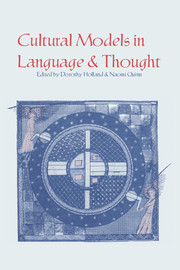Book contents
- Frontmatter
- Contents
- Preface
- List of Contributors
- Introduction
- 1 Culture and cognition
- Part I Presupposed worlds, language, and discourse
- Part II Reasoning and problem solving from presupposed worlds
- Part III The role of metaphor and analogy in representing knowledge of presupposed worlds
- Part IV Negotiating social and psychological realities
- Part V An appraisal
- Index
1 - Culture and cognition
Published online by Cambridge University Press: 05 June 2012
- Frontmatter
- Contents
- Preface
- List of Contributors
- Introduction
- 1 Culture and cognition
- Part I Presupposed worlds, language, and discourse
- Part II Reasoning and problem solving from presupposed worlds
- Part III The role of metaphor and analogy in representing knowledge of presupposed worlds
- Part IV Negotiating social and psychological realities
- Part V An appraisal
- Index
Summary
Undeniably, a great deal of order exists in the natural world we experience. However, much of the order we perceive in the world is there only because we put it there. That we impose such order is even more apparent when we consider the social world, in which institutions such as marriage, deeds such as lying, and customs such as dating happen at all because the members of a society presume them to be. D'Andrade (1984a:91) contrasts such culturally constructed things with cultural categories for objects such as stone, tree, and hand, which exist whether or not we invent labels for them. An entity such as marriage, on the other hand, is created by “the social agreement that something counts as that condition” (ibid.) and exists only by virtue of adherence to the rules that constitute it.
Such culturally constituted understandings of the social world point up not only the degree to which people impose order on their world but also the degree to which such orderings are shared by the joint participants in this world, all of whom behave as though marriage, lying, and dating exist. A very large proportion of what we know and believe we derive from these shared models that specify what is in the world and how it works.
The cognitive view of cultural meaning
The enigma of cultural meaning, seemingly both social and psychological in nature, has challenged generations of anthropologists and stimulated the development of several distinctive perspectives (see Keesing 1974 for an early review).
- Type
- Chapter
- Information
- Cultural Models in Language and Thought , pp. 3 - 40Publisher: Cambridge University PressPrint publication year: 1987
- 233
- Cited by



